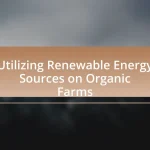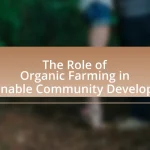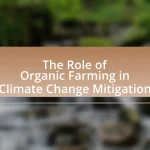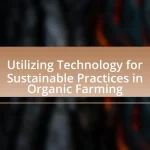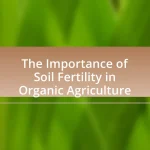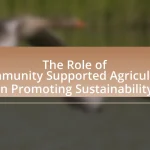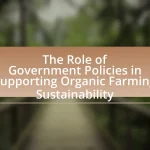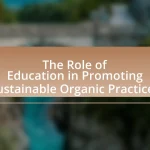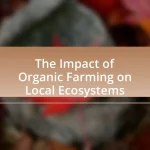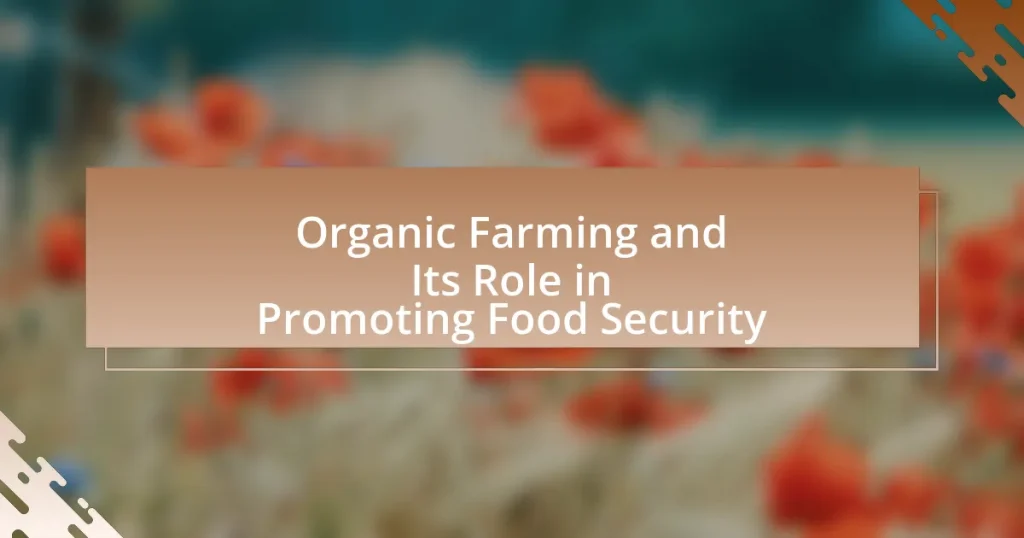Organic farming is an agricultural practice that prioritizes natural processes and materials, avoiding synthetic fertilizers and pesticides, and plays a vital role in enhancing food security. This article explores the differences between organic and conventional farming, highlighting key principles such as biodiversity, soil health, and ecological balance. It discusses the impact of organic farming on soil health, food security, and environmental sustainability, while also addressing the economic benefits for local communities and the social implications of organic practices. Furthermore, the article outlines challenges to food security, the relationship between sustainable agriculture and food availability, and the policies and educational programs that can promote organic farming to ensure a stable food supply for future generations.
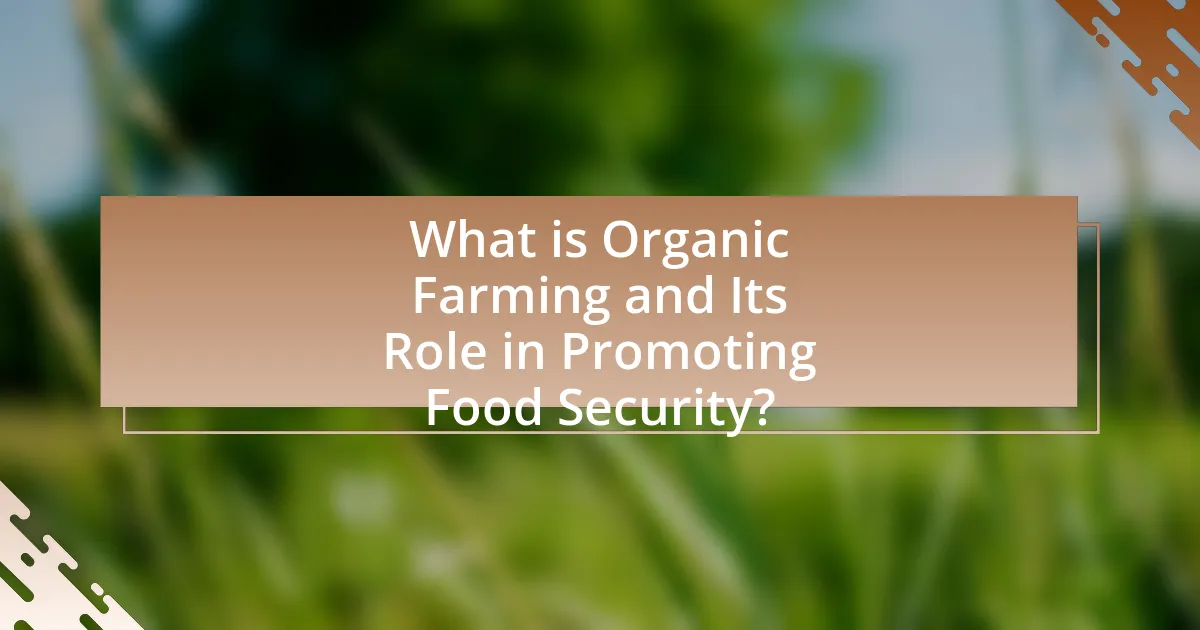
What is Organic Farming and Its Role in Promoting Food Security?
Organic farming is an agricultural practice that emphasizes the use of natural processes and materials, avoiding synthetic fertilizers and pesticides. This method plays a crucial role in promoting food security by enhancing soil health, increasing biodiversity, and reducing dependency on chemical inputs, which can lead to more sustainable food production systems. According to the Food and Agriculture Organization (FAO), organic farming can improve food security by increasing crop resilience to climate change and reducing environmental degradation, thus ensuring a stable food supply for future generations.
How does organic farming differ from conventional farming?
Organic farming differs from conventional farming primarily in its use of synthetic inputs; organic farming prohibits synthetic pesticides and fertilizers, while conventional farming often relies on them for crop production. Organic farming emphasizes natural processes and biodiversity, utilizing practices such as crop rotation, composting, and biological pest control to maintain soil health and ecosystem balance. In contrast, conventional farming typically focuses on maximizing yield through chemical inputs and monoculture practices. Research indicates that organic farming can enhance soil quality and reduce environmental impact, as shown in studies like “Comparative Analysis of Organic and Conventional Farming Systems” published in the Journal of Sustainable Agriculture, which highlights the benefits of organic methods in promoting sustainable agriculture.
What are the key principles of organic farming?
The key principles of organic farming include the use of natural inputs, biodiversity, soil health, and ecological balance. Organic farming emphasizes the avoidance of synthetic fertilizers and pesticides, promoting instead the use of organic matter and natural pest control methods. This approach enhances biodiversity by encouraging a variety of crops and livestock, which contributes to a resilient ecosystem. Maintaining soil health is crucial, as organic practices such as crop rotation and cover cropping improve soil structure and fertility. Additionally, organic farming aims to create an ecological balance that supports sustainable agricultural practices, ultimately contributing to food security by producing healthy food while preserving the environment.
How does organic farming impact soil health?
Organic farming significantly enhances soil health by promoting biodiversity, improving soil structure, and increasing organic matter content. The practices involved in organic farming, such as crop rotation, cover cropping, and the use of organic fertilizers, contribute to a more diverse microbial community in the soil, which is essential for nutrient cycling and soil fertility. Research indicates that organic farming can increase soil organic carbon levels by 30% to 50% compared to conventional farming methods, leading to improved soil structure and water retention. Additionally, organic farming reduces soil erosion and degradation, as it emphasizes sustainable practices that maintain soil integrity over time.
Why is food security important in today’s world?
Food security is crucial in today’s world because it ensures that all individuals have reliable access to sufficient, safe, and nutritious food to maintain a healthy life. This is particularly important as global population growth is projected to reach 9.7 billion by 2050, increasing the demand for food and putting pressure on agricultural systems. Additionally, food insecurity is linked to various social issues, including poverty, malnutrition, and political instability, which can lead to conflict and migration. According to the Food and Agriculture Organization, approximately 690 million people were undernourished in 2019, highlighting the urgent need for effective food security measures to address hunger and promote sustainable development.
What are the main challenges to achieving food security?
The main challenges to achieving food security include climate change, economic instability, and inadequate infrastructure. Climate change affects agricultural productivity through extreme weather events and shifting growing seasons, leading to reduced crop yields. Economic instability, characterized by fluctuating food prices and income disparities, limits access to food for vulnerable populations. Inadequate infrastructure, such as poor transportation and storage facilities, hampers food distribution and increases post-harvest losses. According to the Food and Agriculture Organization, approximately 690 million people were undernourished in 2019, highlighting the urgency of addressing these challenges to ensure food security for all.
How does food security relate to sustainable agriculture?
Food security is directly related to sustainable agriculture as it ensures a stable supply of nutritious food while preserving environmental resources. Sustainable agriculture practices, such as crop rotation, organic farming, and agroecology, enhance soil health and biodiversity, which are crucial for long-term food production. According to the Food and Agriculture Organization (FAO), sustainable agricultural practices can increase food production by up to 58% while reducing greenhouse gas emissions, thereby supporting food security in a changing climate. This relationship highlights that sustainable agriculture not only meets current food needs but also safeguards resources for future generations, ensuring ongoing food availability and access.
What role does organic farming play in enhancing food security?
Organic farming plays a crucial role in enhancing food security by promoting sustainable agricultural practices that increase crop diversity and resilience. This method reduces dependency on chemical inputs, which can degrade soil health and biodiversity, ultimately leading to more stable food production systems. Research indicates that organic farms can yield comparable or even higher outputs than conventional farms under certain conditions, particularly in developing regions where soil fertility is a concern. For instance, a study published in the journal “Nature” found that organic farming can increase yields by up to 30% in low-input systems, thereby contributing to food availability and accessibility. Additionally, organic farming practices improve soil health, which is essential for long-term agricultural productivity and food security.
How can organic farming increase food production sustainably?
Organic farming can increase food production sustainably by enhancing soil health, promoting biodiversity, and reducing reliance on synthetic inputs. Healthy soil, enriched through organic practices like crop rotation and composting, improves nutrient availability and water retention, leading to higher crop yields. Biodiversity, fostered by organic methods, helps control pests naturally and enhances ecosystem resilience. According to a study published in the journal “Nature,” organic farming can yield comparable or even higher outputs than conventional methods in certain contexts, particularly when considering long-term sustainability and environmental health. This evidence supports the assertion that organic farming not only boosts food production but does so in a manner that preserves ecological balance.
What are the economic benefits of organic farming for local communities?
Organic farming provides significant economic benefits for local communities by enhancing local economies, creating jobs, and increasing income levels. Local farmers engaged in organic practices often receive premium prices for their products, which can lead to higher overall revenue compared to conventional farming. According to a study published by the Rodale Institute, organic farming can yield 40% more income per acre than conventional methods due to the demand for organic products. Additionally, organic farming practices often require more labor, resulting in job creation within the community. This increased employment can stimulate local economies as workers spend their earnings on goods and services in the area. Furthermore, organic farming promotes sustainable practices that can lead to long-term economic stability by preserving local resources and enhancing soil health, which is crucial for future agricultural productivity.
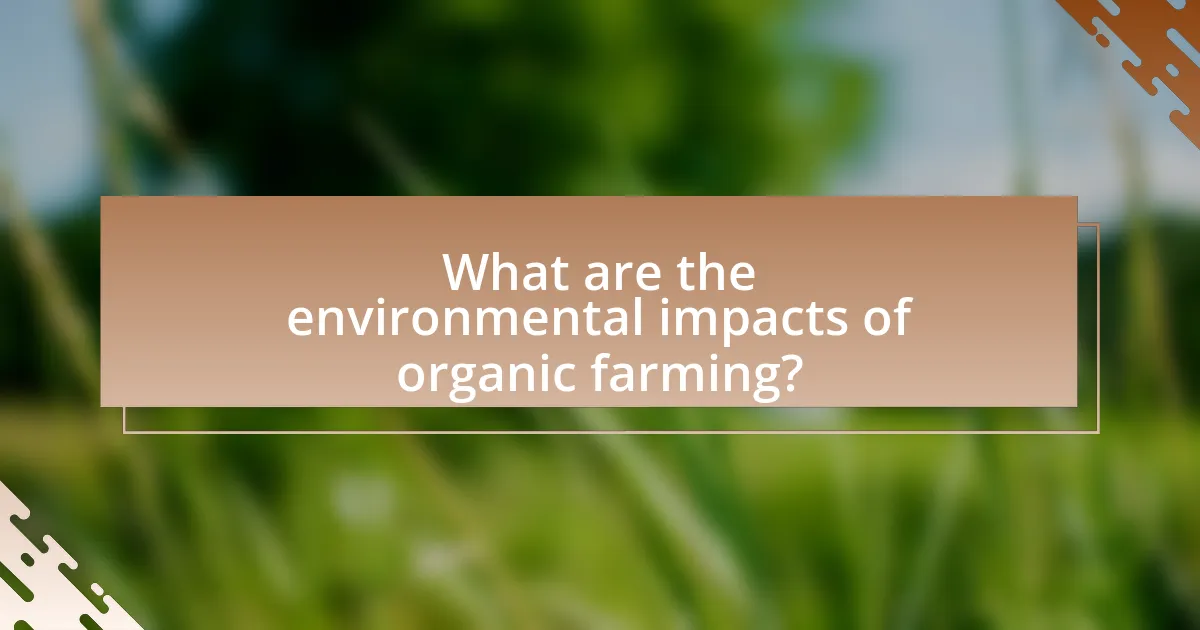
What are the environmental impacts of organic farming?
Organic farming has several positive environmental impacts, including enhanced biodiversity, improved soil health, and reduced pollution. By avoiding synthetic pesticides and fertilizers, organic farming practices promote a diverse ecosystem, which supports various plant and animal species. Research indicates that organic farms can have up to 30% more biodiversity compared to conventional farms. Additionally, organic farming enhances soil quality through practices like crop rotation and composting, which increase organic matter and nutrient availability. This leads to better water retention and reduced soil erosion. Furthermore, organic farming minimizes chemical runoff into waterways, thereby decreasing water pollution and protecting aquatic ecosystems. Studies show that organic farming can reduce greenhouse gas emissions by up to 40% compared to conventional methods, contributing to climate change mitigation.
How does organic farming contribute to biodiversity?
Organic farming contributes to biodiversity by promoting a diverse ecosystem through practices that enhance soil health, reduce chemical inputs, and encourage a variety of plant and animal species. This farming method utilizes crop rotation, intercropping, and organic fertilizers, which foster a habitat for beneficial organisms and pollinators. Research indicates that organic farms typically host 30% more species than conventional farms, as shown in a study published in the journal “Nature” by Benis et al. (2020), highlighting the positive impact of organic practices on species richness and ecosystem resilience.
What practices in organic farming support ecosystem health?
Practices in organic farming that support ecosystem health include crop rotation, cover cropping, and the use of organic fertilizers. Crop rotation enhances soil fertility and disrupts pest cycles, reducing the need for chemical pesticides. Cover cropping prevents soil erosion, improves soil structure, and enhances biodiversity by providing habitat for beneficial organisms. The use of organic fertilizers, such as compost and manure, enriches the soil with nutrients while promoting microbial activity, which is essential for a healthy ecosystem. These practices collectively contribute to sustainable agricultural systems that maintain ecological balance and promote biodiversity.
How does organic farming reduce pollution and chemical runoff?
Organic farming reduces pollution and chemical runoff by eliminating synthetic fertilizers and pesticides, which are major contributors to water contamination. Instead, organic practices utilize natural inputs such as compost and crop rotation, which enhance soil health and reduce the need for chemical interventions. Research indicates that organic farming can decrease nitrogen runoff by up to 50% compared to conventional methods, as shown in studies conducted by the Rodale Institute. This reduction in chemical use leads to cleaner waterways and healthier ecosystems, supporting both environmental sustainability and food security.
What are the social implications of organic farming?
Organic farming has significant social implications, including enhanced community engagement and improved public health outcomes. By prioritizing sustainable practices, organic farming fosters local economies through the support of small-scale farmers and encourages community involvement in food production. Studies indicate that organic farming can lead to better nutritional quality of food, which contributes to improved health among consumers. Additionally, organic farming practices often promote social equity by providing fair wages and working conditions for farm laborers, thereby addressing issues of labor rights and social justice in agricultural sectors.
How does organic farming affect rural employment and livelihoods?
Organic farming positively affects rural employment and livelihoods by creating more job opportunities and enhancing income stability. Studies indicate that organic farming practices often require more labor compared to conventional farming, leading to increased employment in rural areas. For instance, a report by the Research Institute of Organic Agriculture found that organic farms can employ up to 30% more labor per hectare than conventional farms, which translates to higher job availability. Additionally, organic farming can improve local economies by promoting sustainable practices that lead to better market prices for farmers, thereby increasing their income and overall livelihood security.
What role does consumer awareness play in the success of organic farming?
Consumer awareness is crucial for the success of organic farming as it drives demand for organic products. When consumers are informed about the benefits of organic farming, such as reduced pesticide use and environmental sustainability, they are more likely to choose organic options over conventional ones. This increased demand encourages farmers to adopt organic practices, leading to a larger market share for organic products. According to the Organic Trade Association, the U.S. organic market reached $62 billion in 2020, highlighting the significant impact of consumer awareness on market growth. Thus, informed consumers directly influence the viability and expansion of organic farming.
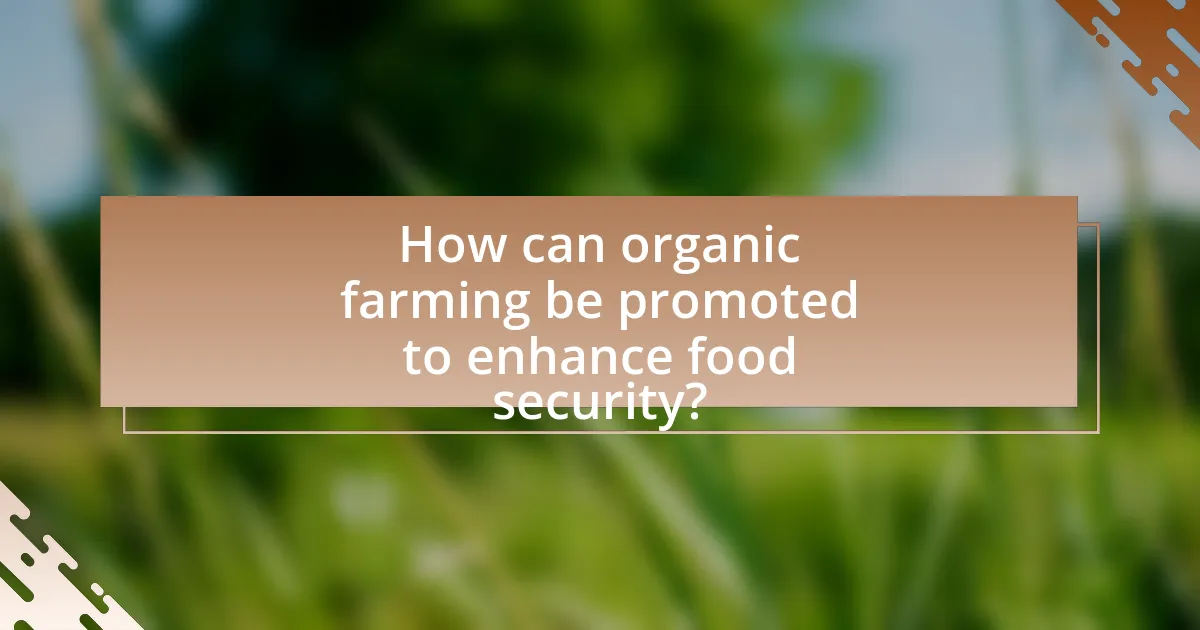
How can organic farming be promoted to enhance food security?
Organic farming can be promoted to enhance food security by implementing educational programs that inform farmers about sustainable practices and providing financial incentives for adopting organic methods. Research indicates that organic farming can increase crop yields by 20% to 30% in developing countries, thereby improving food availability. Additionally, government policies that support organic certification and access to markets can further encourage farmers to transition to organic practices, ultimately contributing to a more resilient food system.
What policies can support the growth of organic farming?
Policies that can support the growth of organic farming include financial incentives, regulatory frameworks, and educational programs. Financial incentives, such as subsidies and grants, can reduce the initial costs for farmers transitioning to organic practices, thereby encouraging adoption. Regulatory frameworks that simplify certification processes can make it easier for farmers to obtain organic status, promoting market access. Educational programs that provide training on organic farming techniques can enhance farmers’ skills and knowledge, leading to improved productivity and sustainability. For instance, the USDA’s Organic Certification Cost Share Program has provided financial assistance to farmers, resulting in increased organic acreage in the United States.
How can governments incentivize organic farming practices?
Governments can incentivize organic farming practices by providing financial subsidies, tax breaks, and grants to farmers who adopt organic methods. These financial incentives lower the economic barriers for farmers transitioning to organic practices, making it more feasible for them to invest in organic inputs and certification processes. For instance, the USDA’s Organic Certification Cost Share Program offers reimbursements for certification costs, which encourages more farmers to pursue organic farming. Additionally, governments can implement educational programs that inform farmers about the benefits of organic farming, further promoting its adoption.
What role do educational programs play in promoting organic farming?
Educational programs play a crucial role in promoting organic farming by providing farmers with essential knowledge and skills related to sustainable agricultural practices. These programs educate participants on organic farming techniques, pest management, soil health, and crop rotation, which are vital for enhancing productivity while minimizing environmental impact. Research indicates that regions with robust educational initiatives see a significant increase in organic farming adoption; for instance, a study published in the Journal of Sustainable Agriculture found that farmers who participated in educational workshops were 40% more likely to transition to organic methods compared to those who did not. This evidence underscores the effectiveness of educational programs in fostering a shift towards organic farming, ultimately contributing to food security and environmental sustainability.
What are some best practices for implementing organic farming?
Best practices for implementing organic farming include using crop rotation, maintaining soil health, and employing integrated pest management. Crop rotation prevents soil depletion and reduces pest and disease cycles, enhancing biodiversity. Maintaining soil health through composting and cover cropping improves nutrient availability and soil structure, which is essential for sustainable yields. Integrated pest management combines biological, cultural, and mechanical practices to control pests while minimizing chemical use, thus protecting the ecosystem. These practices are supported by research indicating that organic farming can improve food security by increasing resilience to climate change and enhancing soil fertility.
How can farmers transition from conventional to organic farming?
Farmers can transition from conventional to organic farming by adopting organic practices, which include eliminating synthetic fertilizers and pesticides, implementing crop rotation, and enhancing soil health through composting and cover cropping. This transition typically requires a three-year period to meet organic certification standards, during which farmers must document their practices and inputs. Research indicates that organic farming can improve biodiversity and soil quality, leading to sustainable agricultural systems that contribute to food security. For instance, a study published in the journal “Agriculture, Ecosystems & Environment” found that organic farming systems can yield comparable or higher outputs than conventional systems while promoting environmental health.
What resources are available for new organic farmers?
New organic farmers have access to various resources, including educational programs, financial assistance, and networking opportunities. Organizations such as the USDA’s National Organic Program provide guidelines and certification processes, while local extension services offer workshops and training tailored to organic practices. Additionally, grants and loans specifically for organic farming are available through programs like the USDA’s Organic Transition Program, which supports farmers transitioning to organic methods. Networking through associations like the Organic Farming Research Foundation can also connect new farmers with experienced mentors and valuable information.
